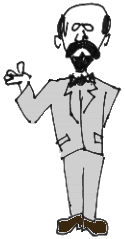Emile Durkheim
 Your book, following Nisbet (1966) divides 19th century thinkers into liberals, radicals, and conservatives, and identifies Dukheim as a conservative, like Burke and Le Play. The division doesn't work and Durkheim should never be grouped with thinkers like Burke. They actually come from opposite sides of the political spectrum.
Your book, following Nisbet (1966) divides 19th century thinkers into liberals, radicals, and conservatives, and identifies Dukheim as a conservative, like Burke and Le Play. The division doesn't work and Durkheim should never be grouped with thinkers like Burke. They actually come from opposite sides of the political spectrum.
Burke was a key opponent of both democracy in general and the French Revolution in particular. Le Play was a polemical apologist for the French Aristocracy in general and the Catholic Church in particular.
Durkheim, on the other hand, was a firm believer in the French Revolution, democracy, the rights of man, etc. He was a friend of the socialist leader Jean Jaures, and a loyal member of the French government. Wilk and Cliggett misunderstand his position on individualism. Durkheim believes in progress. He thinks that societies evolve from mechanical to organic solidarity. The individual emerges as part of this process. The utopian destiny of humanity is a society that is so completely organic that each person is free to express their individuality.